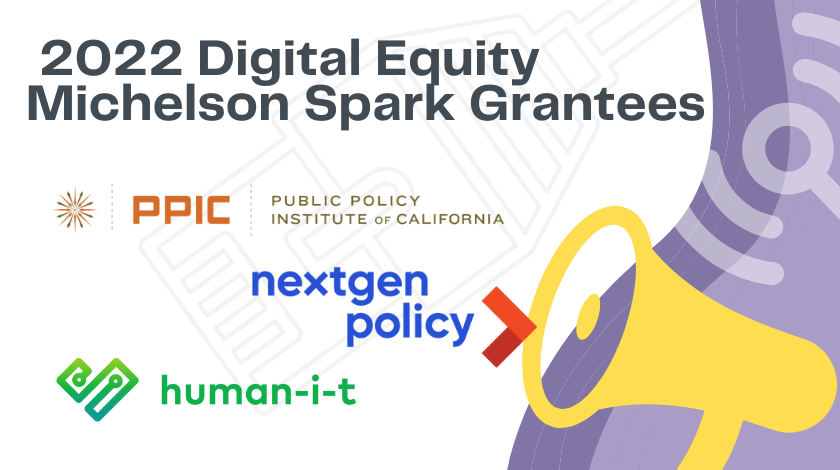News and Announcements
Get to Know Our 2022 Digital Equity Spark Grantees
Published Date
- April 26, 2022

Although 90% of Californians have access to the internet, according to the University of Southern California many low-income households still lack connectivity. In fact, only 71% of individuals earning less than $40,000 per year in the state have an internet connection, which includes connecting via a smartphone. At a time when access to the internet determines one’s ability to attend classes, complete homework, find and apply for jobs, apply for public assistance, and join telehealth visits, it is essential that we close the digital divide.
As a part of our commitment to help close the digital divides, we actively sought proposals for the 2022 Michelson Spark Grants Digital Equity funding cycle that will surface and scale digital equity solutions throughout the state by:
- Informing, engaging, and bringing together diverse groups to elevate and take action against industry’s false narrative that improving speeds for ”underserved” communities or building infrastructure in urban areas is “overbuilding”
- Transforming digital navigator models beyond basic digital literacy and leverage them to help end users connect to supplemental resources
- Uplifting the experiences of students and their families in navigating digital inequity and highlighting the intersectionality of the digital divide to affect systems and/or policy change
- Conducting landscape analyses/literature reviews of existing digital inclusion resources for scaling/translating
- Addressing inequities that exist in education, healthcare/public health, and civic engagement in a scalable manner.
As proposals were received, a team of Spark Community Advisors (SCAs) composed of students, community leaders, advocates, and digital equity subject matter experts evaluated the submissions to determine which projects best align with the foundation’s 2022 focus areas. By establishing a participatory grantmaking process, the Spark Grants program hopes to utilize the expertise of those doing digital equity work on the ground in their communities to inform our giving strategy. Following their analysis and counsel, we are proud to welcome the 2022 Digital Equity Spark Grantees!
Human-I-T provides bi-lingual digital skills training for thousands of individuals impacted by digital inequity. Over the coming year, they will expand their digital literacy offerings to include eight new modules covering topics such as telehealth, accessing digital public social services, online banking, and more.
The CA Alliance for Digital Equity (CADE), by Nextgen Policy, will build capacity among nonprofit partners throughout the state who will then educate and inform policy makers and other decision makers of their communities broadband needs. Nonprofit and community leaders will highlight the importance of ensuring that equity drives the decisions and investments made by the state in broadband policy and programs.
The Public Policy Institute of California (PPIC) will examine the implementation of SB 156, the largest public broadband investment in the nation. Their research will consider how communities plan to expand broadband infrastructure and adoption and will identify what community factors inform implementation approaches; additionally, PPIC seeks to uncover if there are replicable statewide partnership models.
Over the coming weeks, we look forward to further expounding upon each grantee and their efforts as they join the 2020 and 2021 cohorts of Digital Equity Spark Grantees!
Michelson 20MM is a private, nonprofit foundation seeking to accelerate progress towards a more just world through grantmaking, operating programs, and impact investing. Co-chaired and funded by Alya and Gary Michelson, Michelson 20MM is part of the Michelson Philanthropies network of foundations.
To sign up for our newsletter, click here.